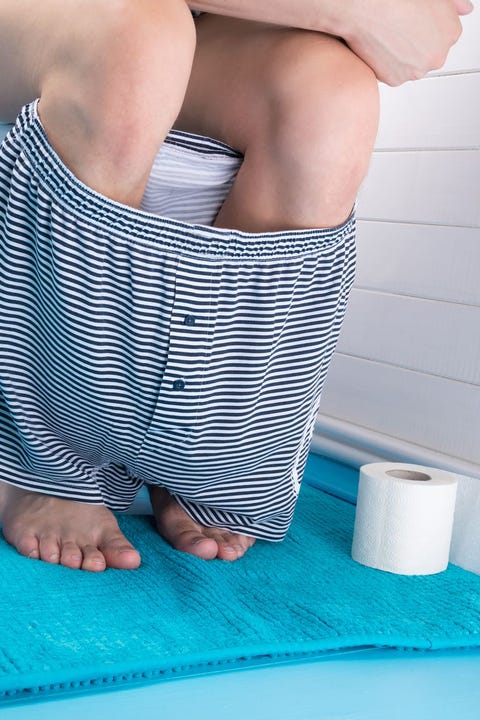It’s been two days until you last pooped, which seems unordinary, but eventually the time will come, right? Then it’s three days, and four, until finally you’ve gone a week without pooping.
Chances are you’ve experienced this uncomfortable scenario, since constipation—defined as having fewer than three bowel movements a week—impacts about 42 million Americans at some point every year. In fact, most of us will be constipated about every other month, Dr. John Whyte, Chief Medical Officer of WebMD, tells Men’s Health.
When you’re constipated, finding relief is probably the main thing on your mind. But you also may be wondering: Can it actually be dangerous to be constipated? And how long is too long to go without pooping?
Despite some very extreme constipation stories, there’s no need to worry about dying or having your intestines explode, says Whyte.
“Our intestines are like tubes, [and] they’re pretty strong tubes,” he says.
Constipation becomes dangerous when you develop a bowel obstruction from impacted feces stuck in your digestive tract , but that generally occurs in people who have underlying health issues, like Parkinson’s Disease.
“Usually most of us on are own don’t become impacted,” he says.
As for when you should get worried about your lack of poop? That really depends.
“On average, most of us don’t make a bowel movement every day,” he explains.
Some people really only have bowel movements several times a week, says Dr. Robert Glatter, emergency physician at Lenox Hill hospital.
“It’s highly variable and people often know their own particular habits,” he says. That said, “Not going for more than three consecutive days should grab your attention,” he warns. Glatter becomes concerned when patients are constipated for more than a week, especially if they’re unable to pass gas, experience stomach pain, and have a swollen belly.
This could be a sign of a bowel obstruction. When this happens, the impacted feces prevents blood from flowing into your colon, which causes stomach pain—and even tears— in your bowels. People who have impacted feces will need to seek medical help to have the stool removed from their colon or rectum.
Whyte says you’ll most likely know if your feces are impacted because it will feel like there’s something stuck at the opening of your anus.
“It’s very uncomfortable. Everything backs up,” he explains.
Both Glatter and Whyte recommend taking action before it gets to this point. Begin by eating prunes or taking a mild laxative such as Miralax. If that doesn’t work, then it’s time to see your doctor.

Kurgu128Getty Images
Whyte says it’s safe to try laxatives twice before seeking medical help, but cautions against making it a part of your bathroom routine.
“People who are using it every week are training their body to use these medications,” he says. “You should not be using that more than once a month. At the most.”
Source: Read Full Article






